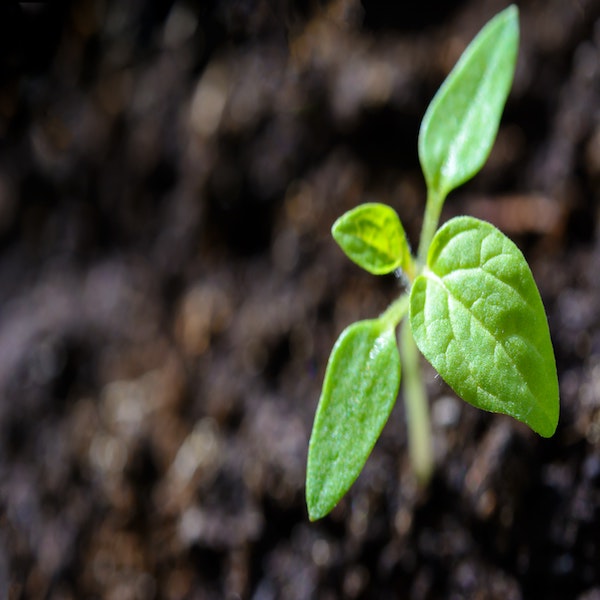The 5 Fertilizers That Will Also Encourage Soil Health
•Posted on August 09 2019

One key element that is often overlooked in gardening is healthy soil.
You can feed your plants all the nutrients you want, but if your soil health is lacking, your plants won’t reach their full potential.
What’s the easiest way to combat this? By feeding your soil of course!
Our soil is comprised of tiny microorganisms and beneficial bacteria that work together to contribute to your plant’s health by providing a healthy foundation for root growth and nutrient uptake.
The healthier your soil, the more nutrients it can hold onto rather than losing essential minerals to runoff or remaining locked up in the dirt.
This is generally due to the work of soil bacteria that make the soil environment favorable for your plants.
Soil microorganisms can be classified as the following:
1. Bacteria

Organisms that have one cell and are microscopic.
You can find anywhere from 100 million to 1 billion bacteria in just one teaspoon of fertile soil.
Bacteria are known as the decomposers of the bunch – eating dead plant material and organic waste.
Their decomposing nature allows them to release nutrients that other organisms wouldn’t have been able to access on their own.
2. Actinomycetes

Organisms that are similar to both bacteria and fungi. These guys give soil its characteristic smell.
3. Fungi

Fungi are neither plants nor animals. Decomposer and Mycorrhizal fungi are helpful to plants while others, like parasitic fungi, are harmful.
The helpful ones break down and release nutrients in the soil for other organisms to use, much like bacteria.
They can form a beneficial relationship with plants where they attach themselves to the plant roots and provide the plant with essential nutrients, while the plant gives them carbohydrates.
4. Algae

Algae microorganisms typically get a bad rap for producing the slimy, green plant that most would consider a nuisance, but they play an important role in soil fertility.
Algae add organic matter back into the soil when they die, bind soil particles to prevent soil erosion and increase the soil’s water retention.
5. Protozoa

Colorless, single-celled organisms that are larger than bacteria.
Protozoa play an important role in maintaining microbial/bacterial equilibrium by feeding or ingesting soil bacteria.
6. Viruses

Viruses may sound intimidating, but they determine the ecology of soil microbiological communities both by transferring genes from different bacterial hosts and causing bacterial mortality rates.
Fertilizers That Enrich Your Soil
While most fertilizers only provide nutrients for your plants, there are some that are known to make your plants healthier while supplementing your soil to encourage microorganism growth.
Below are a few of our favorites:
1. Fish Bone Meal

Fish Bone Meal is a marine based alternative to the more commonly used Bone Meal.
It’s made from ground up fish bones sourced organically to provide Phosphorus to your plants for healthy root growth, cell division and seed formation.
Fish bone meal feeds the friendly fungus in your soil.
2. Kelp Meal

Our Kelp Meal is made from a special species of giant kelp found along the Pacific coasts, Macrocystis pyrifera.
What makes this species unique is that it is known to contain higher concentrations of nitrogen potassium than other kelps available on the market.
It's harvested from the Pacific Ocean and sun-dried until it is ready for processing. Kelp Meal feeds both bacteria and fungi.
3. Alfalfa Meal

Alfalfa Meal 2.5-0-2.5 is an excellent, all-purpose fertilizer when supplemented with a source of phosphorus.
Alfalfa Meal has the ability to increase water retention, improve soil structure, and stimulate biological activity.
Our Alfalfa Meal is non-GMO, builds organic matter and feeds microorganisms because it is high in sugar favorable to soil bacteria and fungi.
4. Feather Meal

Feather Meal 12-0-0 is one of the most economical sources of nitrogen available to organic growers.
Low in water-soluble nitrogen, Feather Meal provides a slower release of nitrogen over a longer period of time.
It can feed the helpful fungi in your soil.
5. Azomite

Azomite is a distinct organic source of a broad spectrum of approximately 70 trace mineral elements and micro-mineral which are vital in both plants and animals.
It's mined from mineral-rich volcanic ash deposits and contains rare elements not found in other organic and artificial fertilizer.
Azomite trace minerals improve the mineral content of nutrient-depleted soils.
It has been proven to generally improve root systems, plant vigor in garden vegetables and field crops.
Feed Your Soil
With so many ways of feeding your soil, it's almost a no-brainer to not nourish your soil. Shop these fertilizers above and help your plants achieve their full growth.
Related Posts:
Comments
0 Comments
Leave a Comment